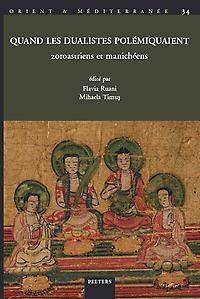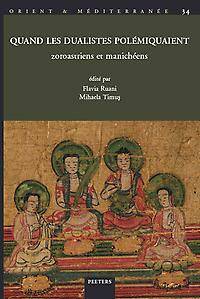
Je cadeautjes zeker op tijd in huis hebben voor de feestdagen? Kom langs in onze winkels en vind het perfecte geschenk!
- Afhalen na 1 uur in een winkel met voorraad
- Gratis thuislevering in België vanaf € 30
- Ruim aanbod met 7 miljoen producten
Je cadeautjes zeker op tijd in huis hebben voor de feestdagen? Kom langs in onze winkels en vind het perfecte geschenk!
- Afhalen na 1 uur in een winkel met voorraad
- Gratis thuislevering in België vanaf € 30
- Ruim aanbod met 7 miljoen producten
Zoeken
Quand les dualistes polémiquaient
Zoroastriens et manichéens
€ 74,00
+ 148 punten
Omschrijving
Les auteurs de cet ouvrage montrent que le zoroastrisme et le manicheisme, qui partagent une vision dualiste du monde et des entites primordiales, ont pose de facon similaire au judaisme, au christianisme et a l'islam la question du rapport des adeptes a la verite et donc a l'erreur des autres. Cet ouvrage apporte donc une pierre fondamentale a l'etude du phenomene de la controverse religieuse dans l'Antiquite tardive et au debut du Moyen Age. Il nous permet de mieux apprehender deux systemes de pensee de l'Orient, en ce qu'ils ont de commun mais aussi dans leur irreductible singularite. The authors of this collected volume show that Zoroastrianism and Manichaeism, which share a dualist vision of the world and the primordial entities, have raised in a similar way to Judaism, Christianity and Islam the question of the relationship of their followers to truth and therefore the error made by others. The volume makes a fundamental contribution to the study of the phenomenon of religious controversy in Late Antiquity and the early Middle Ages. It allows us to better understand two Eastern systems of thought, both in what they have in common and in their irreducible individuality.
Specificaties
Betrokkenen
- Uitgeverij:
Inhoud
- Aantal bladzijden:
- 330
- Taal:
- Frans
- Reeks:
- Reeksnummer:
- nr. 34
Eigenschappen
- Productcode (EAN):
- 9789042944312
- Verschijningsdatum:
- 11/12/2020
- Uitvoering:
- Paperback
- Formaat:
- Trade paperback (VS)
- Gewicht:
- 884 g

Alleen bij Standaard Boekhandel
+ 148 punten op je klantenkaart van Standaard Boekhandel
Beoordelingen
We publiceren alleen reviews die voldoen aan de voorwaarden voor reviews. Bekijk onze voorwaarden voor reviews.








